| Monuments and Historical Sites of Saint Petersburg
|
|
More
than three centuries ago it took Peter the Great’s sagacity, untamed will and
energy to unite the efforts of thousands of Russian people for erecting one of
the most beautiful cities of Europe that was destined to live through the lean
years more than once, still preserving its majestic beauty and imperial spirit.
Everything – palaces, cathedrals, theatres, monuments, granite-clad embankments
– all testify to invincible power and mirror Russia’ turbulent history.
|
| Admiralty |
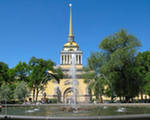 |
One of the magnificent expressions of naval
triumphalism - the Admiralty, initially founded by Peter the Great in 1704 as a
fortified shipyard. The responsibilities of the Admiralty Board had been
changing throughout its history.
More details
|
| Alexander Column |
 |
The monument was erected after the Russian
victory in the war with Napoleon's France.
Named after Emperor Alexander I, who ruled Russia
between 1801 and 1825, the column is an interesting piece of architecture and
engineering.
More details
|
| Bronze Horseman |
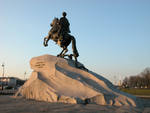 |
A symbol of indomitable will and ruthless
vision, the statue of Peter I known as the Bronze Horseman was
commissioned by Catherine the Great to glorify the “enlightened absolutism”,
designed by a French sculptor E.Falconet in 1782.
More details
|
| Field of Mars |
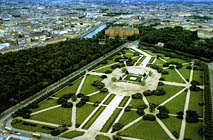 |
The Field of Mars or Marsovo Polye is a large
well-appointed park situated in the center of
Saint-Petersburg, with an area of about 9 hectares, named after the Mars - Roman god of war.
More details
|
| Monument to Catherine the Great |
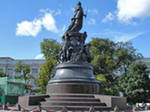 |
The only monument to Catherine the Great in Saint Petersburg, designed by sculptor Mikeshin, was erected on Alexandrinskaya Square,
on which looks the facade of Russia’s
first public library the Empress had established.
More details
|
| Monument to Nicholas I |
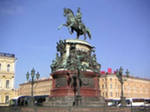 |
At the centre of St. Isaac’s square prances a
haughty, bronze equestrian monument to Nicholas I of Russia. The monument accurately and
powerfully depicts the determined absolutist Russian ruler as a powerful
military figure.
More details
|
| Moscow Triumphal Arch |
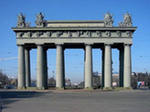 |
The cast-iron Moscow Triumphal Arch, modeled on Berlin’s
Brandenburg Gate, was built by Stasov in late 1830s to commemorate a whole
series of victories against the Persians, Turks and Poles during Nicholas I’s reign.
More details
|
| Narva Gate |
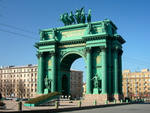 |
The copper-plated Narva Gate, a diminutive
triumphal arch crowned by a statue of Victory astride her six-horde chariot,
was erected to commemorate the Napoleonic Wars and scene of the first of the
many fatal clashes on “Bloody Sunday”.
More details
|
| Neva River |
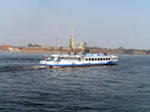 |
No one would deny that Saint-Petersburg’s claim
to fame is the infinite full-watered Neva river which constitutes the downtown and at the same time
connects the major city ports with the Gulf of Finland and Ladoga
Lake.
More details
|
| Piskarevskoe Memorial Cemetery |
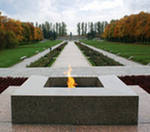 |
The Piskarevskoe
Memorial Cemetery
is a burial place of more than 470.000 citizens, who died of starvation,
bombardments and cold during the siege of Leningrad.
More details
|
| The Spit of Vasilievsky Island
|
|
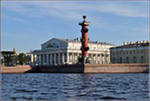
|
The Spit of Vasilievsky Island, which used to
be a working port 1733-1885, is one of the most picturesque places in Petersburg with its
Rostral Columns and stock exchange building - the ensemble created in the 19th
century.
More details
|













